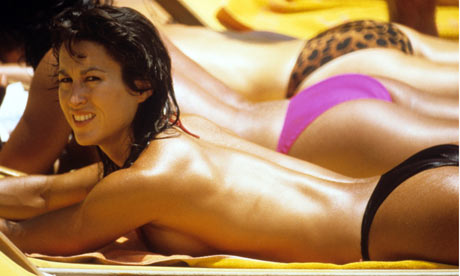
|
SCNA TRAVEL CORNER Travel Menu | So Cal Beaches | Hot Springs | Hiking | Other States | Cruises | Foreign Lands |



|
August, 2010 - Health concerns and new feminist priorities mean French women are giving back their rights and covering up on the beach. Two articles caught our attention this month, one in the British newspaper, The Guardian, and one in the Los Angeles Times, lamenting the trend of young women in France preferring to keep their bikini tops on instead of going top free as in previous decades.writes Angelique Chrisafis in The Guardian: “For some it's a symbol of the feminist struggle for equal rights (see story, left). Topless sunbathing was once the summer battleground of French post-1968 society – educated middle classes insisted that peeling off was a women's right, while family groups claimed exposed nipples would scare children.
“For decades, France has prided itself on being the world capital of seaside semi-nudity. Now the nation is facing a bikini-top backlash. A younger generation of women are covering up, citing new feminist priorities, skin cancer fears and a rebellion against the cult of the fetished body beautiful.
“Since the 1970s, when the French state refused to ban "le topless" on beaches, women's semi-nudity has become a symbol of summer in France. It was a point of national pride that the same freedom to strip off in public was off-limits in other more prudish nations such as the US.
“But in this new century, French 18- to 30-year-olds are rejecting toplessness, boosting the sales of two-piece bikinis and old-fashioned bathing suits.
“A [French] poll found 24% of women were perturbed by toplessness on beaches, while 57% said it was OK in a garden. The argument that seems to be gaining public tractions is if toplessness was allowed, swimmers would take more and more liberties such as arriving with no swimming hat or trunks.
Along the Seine near Paris, topless sunbathing is punishable with a fine. One swimsuit saleswoman said that going topless is no longer seen as a feminist act, as young women see equal pay and work-family balance as more pressing battlegrounds.
French contemporary historian Christophe Granger writes: "In the 1960s and 1970s, toplessness was linked to the women's liberation movement, sexual liberation and a return to nature.
"Historical feminist writing details how the row over toplessness was a struggle for women to do what they liked with their bodies. What has been projected on to it today are different values…It's less about women feeling at ease and free and more that toplessness is linked to the harsh cult of the body beautiful, where no imperfection is tolerated."
Writes Alison Culliford in the Los Angeles Times: “The poet Philip Larkin said in 1963 that “liberated women will change the world.” And nowhere was that revolution more on display, literally, than on the beaches of the French Riviera, where the first bare breasts appeared just a year later. Nearly half a century later, however, the French have fallen out of love with naked breasts on the beach. Is it a conservative backlash, a reaction to health scares, or simply a dictate of fashion?
"When I was a teenager, I did everything to get tan and attract guys, including going occasionally topless," said Dianne, 37, as she lounged under a parasol. "But later in life you want to take better care of your health, and the fashion has changed. People talk more about the risks of UV rays," said the Parisian, who asked to withhold her last name.
“Coralie Kosiada, 23, has never gone topless on a public beach, and doesn't plan to. "Honestly, I don't really like women who show their breasts," she said. "It's a generational question. Mostly 50-year-old women do it. It's kind of passé."
"We don't like men staring.," Fanny said. "It might have been OK when everyone was doing it, but today if you walked to the sea topless, you'd be stared at.”
"The aspiration for summer nudity is too deeply written into the body's desires for the practice to disappear," wrote sociologists Jean-Claude Kaufmann in the magazine Psychologies: "But it's true that in [past] 15 years the cultural markers have completely changed. What was hip is now out of style. Young women in particular are quick to stigmatize 'old' (at 50!) ones who dare to take off their bikini tops."
“Even Elle Magazine has relinquished its habitual topless cover and is featuring pretty 50s-style frilly bikinis. Maybe feminism doesn't really enter the equation, and it really was a case of what looked good.
“Which leads to one more question: Why, then, the insistence on tight Speedos for men in French swimming pools?”
|